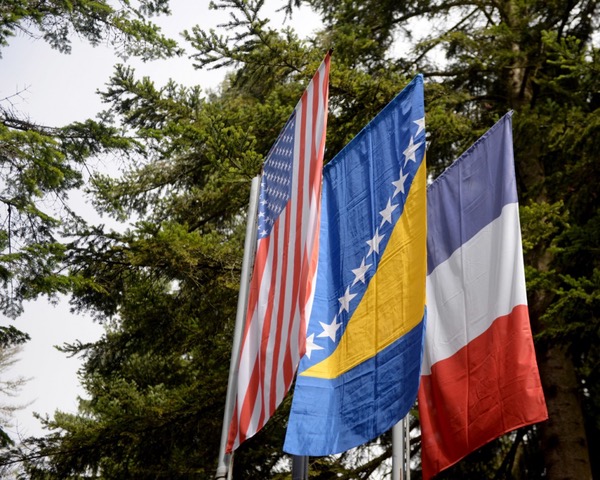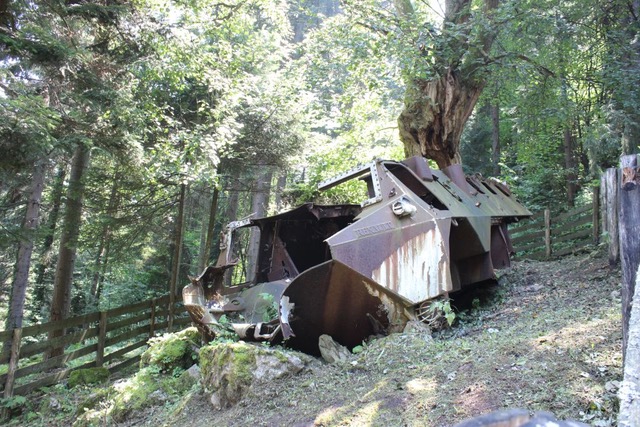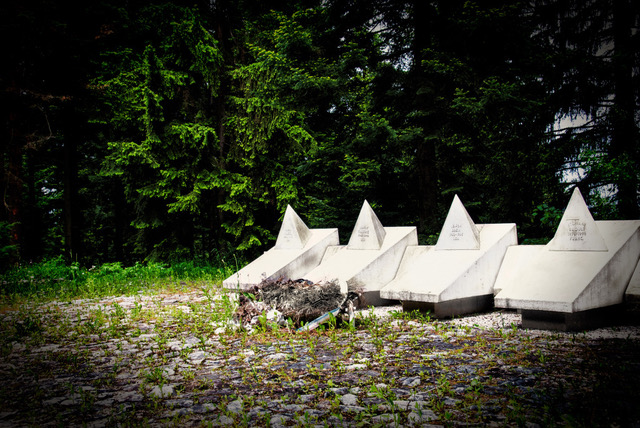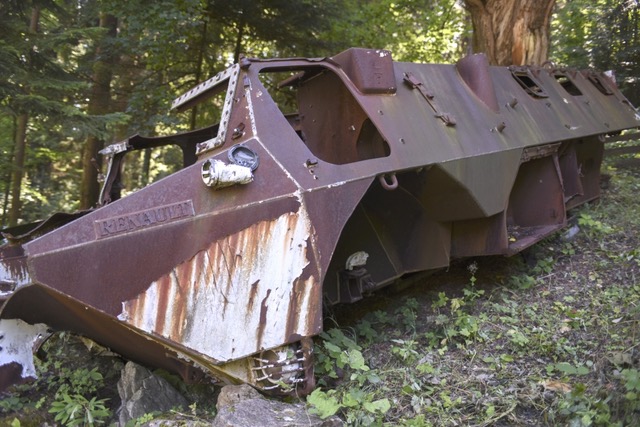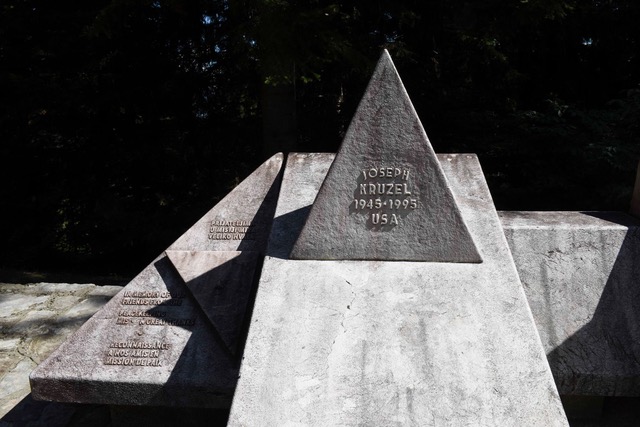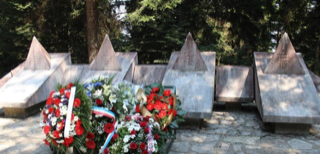US Diplomat Monument at Mount Igman (Spomenik Diplomatama Igman)
Details:
In a clearing on the side of the mountain on the way to the top of Mount Igman.
A large concrete memorial listing the names of the deceased diplomats; the monument sites in a clearing on a stone pedestal where the accident occurred. The hulk of their armored personnel carrier is nearby.
The country of Bosnia Herzegovina erected this monument in 2001 to remember three US diplomats and their French soldier driver who were killed in a tragic accident while working to secure a peaceful solution to the Balkan War of the 1990s.
This article published in the New York Times on August 20, 1995 described the situation:
3 U.S. DIPLOMATS KILLED IN BOSNIA
By Mike O'Connor
Aug. 20, 1995
Three American diplomats promoting a Balkan peace plan were killed today while driving on a narrow, winding mountain road to Sarajevo when their vehicle plunged down a ravine before catching fire and exploding.
American officials, who described the deaths as accidental, said the diplomats were Robert C. Frasure, 53, President Clinton's special envoy to the former Yugoslavia; Joseph Kruzel, 50, Deputy Assistant Secretary of Defense for European and NATO affairs; and S. Nelson Drew, 47, an Air Force Colonel and National Security Council aide. [ Obituaries, page 42. ]
The men were part of a delegation that had come from discussing the American peace initiative with the Presidents of Yugoslavia and Croatia over the last three days and were on their way from Split, Croatia, to Sarajevo to meet with President Alija Izetbegovic of Bosnia.
Their convoy was traveling in French Army armored personnel carriers on a rain-slicked road along Mt. Igman, the only route to Sarajevo not controlled by the Bosnian Serbs.
Richard Holbrooke, the Assistant Secretary of State for European affairs and the head of the delegation, and Lieut. Gen. Wesley Clark, of the Joint Chiefs of Staff, were traveling in a separate vehicle and were uninjured.
One French soldier riding in the vehicle with the three American envoys was also killed, and two other French soldiers were badly injured, French military officers said. Three other Americans were also injured.
Mr. Frasure and Colonel Drew were killed immediately, and Mr. Kruzel died shortly after the crash, officials said.
Initial reports said the vehicle exploded when it hit two land mines placed on the mountainside by the Bosnian Army to defend against possible attack by Bosnian Serb rebels.
[ State Department officials said in Washington on Saturday that the accident occurred about 11:30 A.M. in Bosnia, when the convoy pulled to the side of the road to allow an approaching convoy to pass. The road gave way, and the vehicle rolled 400 yards down into a ravine, they said.
[ A State Department spokesman, David Johnson, said American officials believed that the vehicle did not hit a landmine but rather caught fire when ammunition on the vehicle or its fuel exploded. ]
A Bosnian Foreign Ministry official who spoke on the condition of anonymity said Mr. Frasure's death would seriously affect the peace initiative. "Mr. Frasure was one of the people on the American team who really understood the problems in this region," the official said. "We really think it will be a severe blow to the whole process."
Bosnian officials say they have been generally receptive to the American proposals, the details of which have not been spelled out. Talks are still in the initial stages, however, with the Bosnian Foreign Minister predicting it would be several weeks before it is possible to determine their success.
This evening President Izetbegovic and the Foreign Minister of Bosnia, Muhamed Sacirbey, visited the United States Embassy to express Bosnia's condolences to Mr. Holbrooke. "They were working on the noble cause of peace, on their way here to find the true path of peace," President Izetbegovic said.
Mr. Holbrooke said he had spoken to President Clinton, who expressed his personal condolences. He said Mr. Clinton had known all three of the victims personally.
[ The State Department spokesman in Washington, Mr. Johnson, said Mr. Holbrooke told President Izetbegovic that the United States was intent on continuing its peace effort.
[ Mr. Holbrooke was hoping to leave Sarajevo on Saturday, the spokesman said, but was unable to do so because of bad weather. Mr. Holbrooke, General Clark and the rest of the American delegation were expected to accompany the three bodies back to the United States on Sunday, he said. ]
Mr. Sacirbey called the route over Mt. Igman, "the most dangerous road in the world." It is a dirt and gravel roadway running over a steep mountain. For about 40 miles it can be targeted by Serbian artillery, and parts of the last 15 miles or so are exposed to direct fire from Serbian cannons and heavy machine guns.
About 1,300 French and British soldiers with mortars and light artillery guns are based on the mountain to protect traffic from Serbian attack. While their officers said that the road has become safer since their arrival, United Nations aid officials have judged it too dangerous to use for the last week. The United Nations troops routinely exchange gunfire with the Bosnian Serbs.
In addition to United Nations military convoys, which usually travel in armored personnel carriers, the road is also used by private vehicles and Bosnian Government trucks carrying supplies to the city. Bosnian military convoys also use the road heavily, according to United Nations officials.
In order to make the road safer the United Nations has been widening it to two lanes in places and repairing the damage done by the heavy vehicles.
Canyons and ravines along the road are strewn with the hulks of vehicles attacked by Serbian gunners. Accidents on the road, often from the high speeds used in the hope of escaping gunfire, have caused many deaths. In the last week, accidents killed two British aid workers and a French soldier.
To improve security on the road, the French Government last month sent eight 155-millimeter artillery pieces. However, talks with Bosnian authorities over how the guns were to be used concluded only yesterday, and the guns were not expected to be in place until next week. -------------------- Clinton Salutes Envoys
JACKSON, Wyo., Aug. 19 (By The New York Times) -- President Clinton, who is on vacation here,, was notified of the deaths of the three envoys early Saturday morning by Andrew Sens, the National Security Council aide traveling with him, and spoke by telephone to his national security adviser, Anthony Lake.
Mr. Clinton said he also spoke with Mr. Holbrooke and General Clark in Sarajevo, and with Secretary of State Warren Christopher.
"I have received a full account of what occurred," the President told reporters. "I am convinced that it was a tragic accident."
Asked if the deaths would derail American efforts to seek a diplomatic solution to the Balkans conflict, Mr. Clinton replied:
"No, I hope it will intensify it. The men who gave their lives -- these were immensely talented, patriotic Americans who were profoundly concerned with what the war in Bosnia has done to the people there and what it means for the values of decency and freedom and peace -- and I would think that the thing that they would want us most to press ahead, and that is what we intend to do."
Mr. Clinton said the men "were engaged in the greatest cause of all -- the search for peace," and he ordered flags to be flown at half-staff. He expressed his condolences to the envoys' families, telephoned their widows.
Correction: Aug. 21, 1995
A front-page article yesterday about the deaths of three United States diplomats in Bosnia referred incorrectly to one of the Balkan leaders involved in discussing an American peace plan. It was the President of Serbia, not the President of Yugoslavia, who met with the American delegation.
Monument Text:
The names of the three diplomats and soldier are inscribed on the monument. Their respective years of birth and death are also inscribed. They include:
Joseph Kruzel
1945-1995
USA
Robert Frasure
1942-1995
USA
Nelson Drew
1948-1995
USA
Stephan Reoult
1975-1995
France
On the left side of the monument written in English, French and Bosnian. In English it reads:
IN MEMORY OF OUR
FRIENDS FROM THE
PEACEKEEPING MISSION
MANY THANKS
On the left side of the monument written in English, French and Bosnian. In English it reads:
Citizens of Bosnia Herzegovina
August 2001
Commemorates:
People:
Wars:
Balkans
Other images :


